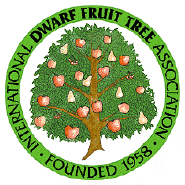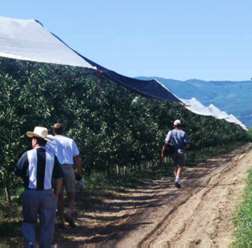
Adversity the Focus of Summer 99 IDFTA Tour
by
Jerome L. Frecon
Agricultural Agent, Rutgers Cooperative Extension

|
Adversity the Focus of Summer 99 IDFTA Tour by Jerome L. Frecon Agricultural Agent, Rutgers Cooperative Extension |
 |
Adversity seemed to be the theme for 80 growers, researchers, extension workers, nurserymen, and media folks that attended the International Dwarf Fruit Tree Association Tour in Western Colorado from June 27 through 30th. Apple growers had been subjected to depressed prices, as well as hail and over 20 spring frosts and low temperature nights that had substantially reduced the crop. Additionally peach cherry and apricot growers had sub zero temperatures in mid December that killed many buds before bloom. Mice, weeds, intense sunlight, were all problems discussed by growers visited near the towns of Paonia, Hotchkiss, Delta, Cedarridge, and Palisade. In spite of these obstacles all of the growers we visited seemed to be optimistic about their profession and determined to use the latest technology to work around these problems and find that specials niche in the market place to feed their love of fruit growing.
We made a quick tour of the Colorado State University Rogers Mesa Station in Hotckiss Colorado. The 80 acre station is under the direction of Dr. Al Gaus, our tour guide leader for the day. A wide variety of field, forage, vegetable and fruit work is done to assist growers in finding new crops. Tree fruit system plantings and an apple rootstock test were observed. Tree fruit insect management is also done at the station.
|
Dan Williams (left) owner of Williams Orchards, discusses his high density plantings of Gala and Cameo near Cedarridge, as IFTA Director, Steve Klackle of Grand Rapids, MI |
The First Fruit Organic Farms near Rogers and Paonia were observed under the direction of brothers Kris and Kevin Kropp. The brothers were tackling a number of adversarial problems including frost which had wiped out much of there apple, cherry and peach crop as well as voles and weeds. Because of low disease and insect pressure the Kropps’ had decided to try organic production with the inherent belief that the environment was healthier for their children. Weeds were a major problem because no chemical herbicides were being used. Some vigorous Rainier, Lapins and Sommerset sweet cherry plantings on Geisela 7 rootstock were observed. A weed barrier was being tried but probably was responsible for the vole damage. The brothers’ focus on Jesus Christ has helped them cope with the adversities of orchard establishment and regular profitability. |
|
Steve Ela (right) manages a partnership called Silver Spruce Orchards near Paonia. Dedicated to the production of organic fruit Mr. Ela emphasized they switched to organic because they get paid more money for it. He had been growing "low input" but saw no benefit economically. A flame thrower was used to control weeds. Generally insect and disease pressure was low. All plantings of peaches were being converted to a perpendicular V with about 500 trees per acre. Unfortunately few trees had any fruit because of -16 degree F. temperatures in December. Most varieties were similar to those grown in the northeastern United States because of the cold winters in this area. |
|
The orchards of Ty and Dan Williams near Cedarridge were an example of super high density. The Williams’ showed various apple plantings of Gala, Fuji, and Cameo 3 to 6 feet in the row, and 11 to 12 feet between rows. A unique system of netting and shade cloth covered some of the plantings to protect fruit from sunburn and hail.
The hail netting is quite expensive but when Ty Williams mentioned how frequently they get hail, the cost of $6500 per acre was justified. Fruit quality was also better under the cloth with their high elevation and intense sunlight.
The Williams felt these super high density systems could only be cost effective it they propagated their own trees -- which they do.
The group later had dinner at the Williams "Apple Shed". An old apple packing house and storage had been converted to a art gallery, gift shop, and dining facility by Mr. and Mrs. Williams. The Apple Shed staff served a delicious meal and many enjoyed Mrs. Williams’s artwork.
|
A view of perpendicular V planting at Fuller Orchards, Palisade, Colorado. NOTE -- the wind machines for frost control accent against the Book Cliffs, in the East Orchard Mesa. |
Two progressive peach farms were visited
in Mesa County near the town of Palisade. Larry Fuller, owner with his family
of Fuller Orchards gave an animated summer pruning demonstration in his
5’ x 15’ perpendicular V plantings. Since most of the fruit from
his orchards had been wiped out by frost he joked about having lots of time
to prune and fish.
Less winter hardy varieties like Topaz, Regina, Redglobe, Suncrest, JunePride, Rich Lady and Flavorcrest are being grown in this area. Mr. Fuller was a big promoter of St. Julian rootstock for their peach orchards because of the high pH soils. Iron chlorosis is a common problem. |
Bruce Talbott, one of the principals of the Talbott Farms, the largest and one of the most diversified fruit growing operations in Colorado, discussed many of the problems they face in growing pears, apples and peaches, Because of 1998 apple prices, Talbott said they were studying alternatives like wine grapes. They have also committed to a large fruit juice processing operation.
The Talbot’s are the largest peach growers and pack for other growers. Peaches are shipped in bushel boxes to retailer through the upper Midwest and central states. Even though his 1999 crop was about 15-20% of normal because of spring frosts Bruce Talbott was optimistic about the future of peach production and marketing. Because of some pest management problems they do not grow organic. They are vacillating between the perpendicular V planting and a four arm quad system.
Two interesting wineries were visited in Mesa County, one specializing in fruit wines and another making wine from honey. The wine industry is one of the fastest growing areas of agriculture in the state.
If you really want to get away from people problems, farm in the Dominquez Canyon. Located about 30 miles southwest of Grand Junction, the area has a history of productive fruit growing Two growers Jerry Holton of Homestead Orchards and Gary Broughton of Dominquez Canyon Fruit showed us their fruitless orchards. A severe frost had wiped out their crop of pears, and peaches. Jerry Holton discussed some of the problems they had in the isolated area with wildlife. Workers have to be aware of snakes, and bear that feed on ripening fruit during the harvest season.
Gary Broughton specializes in peaches. Most of their new plantings were going on the perpendicular V. Varieties were similar to those grown in the East.
Pears are sold to Gerber Products Company in Arkansas while most of the fresh fruit is sold by Gary’s dad Harold Broughton.